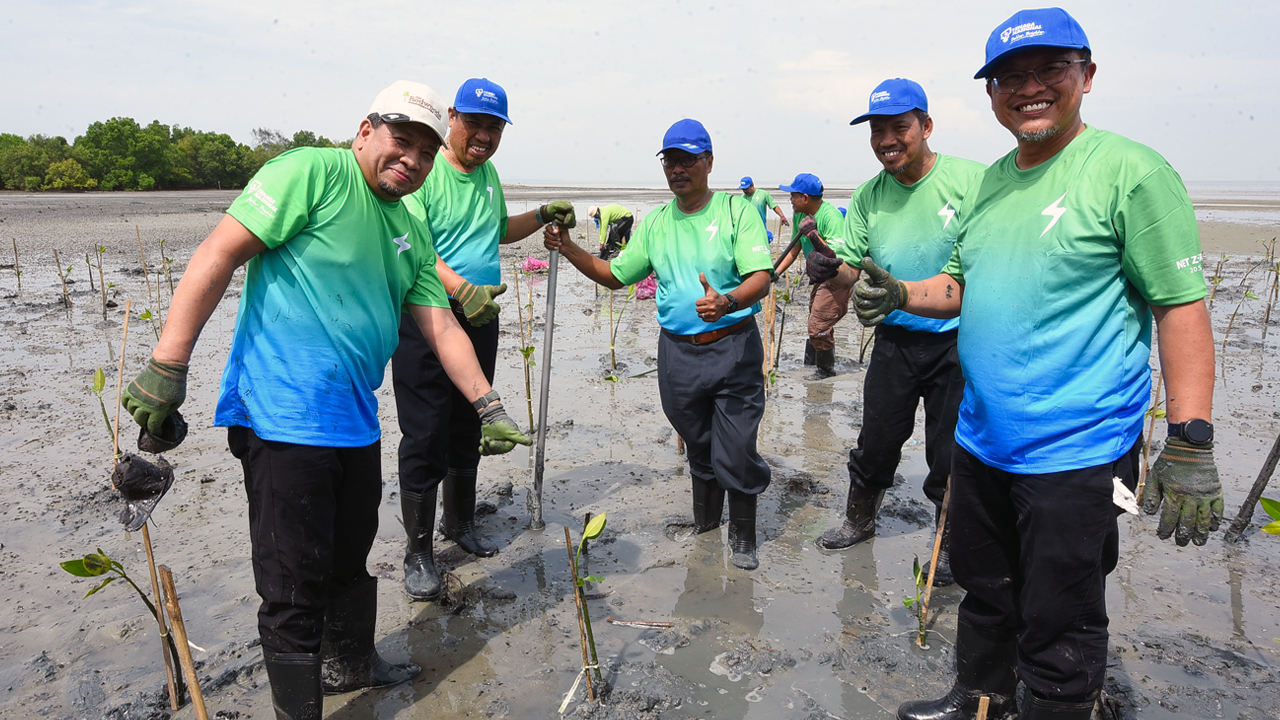This article was first published on 10 October 2024, and updated on 30 March 2025.
In today's world, businesses are increasingly expected to operate with a conscience. At Tenaga Nasional Berhad (TNB), prioritizing environmental responsibility is deeply embedded in our values. In 2023, we allocated RM1.48 million to programs that promote eco-friendly practices, conserve biodiversity, and engage local communities. As part of this ongoing effort, TNB’s environmental program, My Brighter Green, focuses on supporting biodiversity and fostering community involvement. Through our strategic framework, the Sustainability Roadmap 2050, TNB is committed to achieving Net Zero carbon emissions in Malaysia by 2050. This ambitious goal underscores TNB’s dedication to long-term environmental sustainability and aligns with global efforts to combat climate change.
Our initiatives also align with the Malaysian government’s Greening Malaysia Programme, led by the Ministry of Natural Resources and Environmental Sustainability (NRES). This national initiative aims to plant 100 million trees by 2025, emphasizing the importance of large-scale environmental conservation and fostering a shared responsibility for the planet. The campaign, which began in 2021, will conclude next year.
Planting Seeds for a Sustainable Tomorrow
TNB's My Brighter Green programme emphasizes Goal 13 of the Sustainable Development Goals (SDGs), which is Climate Action. Addressing climate change is crucial as it impacts ecosystems, economies, and human well-being. Goal 13 urges urgent action to combat climate change and build resilience. Tree planting is a powerful tool in this effort, as trees act as natural carbon sinks, absorbing greenhouse gases and mitigating their harmful effects.
Launched on September 1, 2023, My Brighter Green focuses on planting two types of trees: mangrove trees (pokok bakau) and landscape trees. Each type provides unique environmental benefits.
Mangroves
Thriving in coastal wetland ecosystems, mangroves serve as nature’s frontline defense against rising sea levels and powerful storms. Their intricate root systems trap and store excess rainwater, reducing flood risks. They also absorb wave energy, protecting coastlines from erosion. Additionally, mangroves support marine biodiversity by providing a vital nursery habitat for species like shellfish and crabs. For local communities, mangrove ecosystems offer sustainable food sources and income through fishing and handicraft production.
Landscape Trees
These trees benefit urban and inland areas by providing shade, which reduces ambient temperatures and creates cooler microclimates. This helps mitigate the "urban heat island effect," where dense building concentrations trap heat. Landscape trees also act as natural air filters, absorbing carbon dioxide—a major greenhouse gas—and releasing oxygen. Their root systems prevent soil erosion, particularly on slopes and unstable land.
Mangrove Restoration: Preserving Coastal Ecosystems
Sustainability management extends to coastal ecosystems as well. Healthy coastlines depend on healthy forests; mangrove roots stabilize shorelines while forests prevent soil erosion that can harm coastal areas. TNB’s mangrove planting program, launched in 2021, reflects our commitment to both terrestrial and marine environments. In 2023, we planted 2,635 mangrove trees (covering approximately equivalent to 5.87 acres), reducing CO2 emissions by approximately 105.4 tonnes annually and contributing to coastal ecosystem restoration.
The Nenggiri Hydroelectric Project
Large-scale development projects can have environmental impacts, but TNB’s Nenggiri Hydroelectric Project demonstrates our commitment to balancing progress with responsibility. We planted 175,890 rubber trees (covering approximately 6,500 acres, approximately sequestering 7,035 tCO2e annually) in the Orang Asli resettlement area. This initiative:
1. Provides Sustainable Livelihoods
Rubber trees offer the Orang Asli community a sustainable income source, promoting economic independence and improving quality of life.
2. Enhances Environmental Sustainability
These trees act as carbon sinks, contributing to carbon sequestration and demonstrating that economic development and environmental well-being can coexist.
Commemorate our 74th Anniversary Through Tree Planting

To commemorate our 74th anniversary last year, we mobilized our workforce for a remarkable tree-planting drive. We planted 78,100 trees across 42 areas nationwide, reforesting approximately 174 acres and potentially sequestering 3,100 tonnes of CO2 annually. In 2023, TNB planted a total of 267,104 trees (approximately equivalent to 6,700 acres and potentially sequestering 10,680 tonnes of CO2 annually), earning the top spot in the government-linked company category under Greening Malaysia Programme. Through My Brighter Green, we achieved an estimated carbon offset of 1,718,200 kg CO2 and produced 1,769,300 litres of oxygen.
Holistic Environmental Approach
In addition to tree planting, TNB is broadening its sustainability management through various initiatives:
- Combating Plastic Pollution: In partnership with the Department of Environment (DOE), TNB addresses plastic pollution through beach clean-up activities, restoring the beauty of coastlines like Pantai Desaru.
- Restoring Degraded Forests: Collaborating with the Malaysian Nature Society (MNS) and Bentong Forestry Department, TNB revitalizes degraded forest areas through joint tree-planting programs, enhancing forest cover and biodiversity.
- Protecting Endangered Species: TNB works with NGOs like Sahabat Alam Sungai Tampik to develop and implement programs focused on protecting endangered tree species and overall forest health.
- Fostering Innovation: In collaboration with the Forest Research Institute Malaysia (FRIM), TNB supports research and development in sustainable forestry practices.
- Building Community Engagement: TNB partners with educational institutions, government agencies, and NGOs. An example is the UNITEN Tree Planting Programme, which saw 20,000 trees planted (approximately equivalent to 45 acres, approximately sequestering 800 tCO2e annually) across five university campus locations in December 2023. This initiative not only increased green cover but also engaged students and staff in environmental action. Further partnerships with State Forestry Departments, UiTM Shah Alam, and TNB Research promote environmental awareness and empower local residents to become active stewards of the environment.
We target to plant 40,000 trees annually, covering around 89 acres and sequestering about 1,600 tCO2e. In 2024, we planted a total of 49,214 trees, covering sequestering about 1,900 tCO2e.Through our participation in the Greening Malaysia Programme and My Brighter Green initiative, we aim to continue making measurable contributions to environmental preservation and community well-being.
Revision History:
30 March 2025: Updated data on trees planted and emissions avoidance in 2024.

